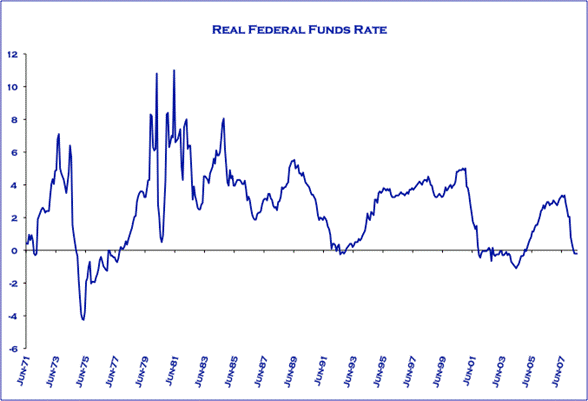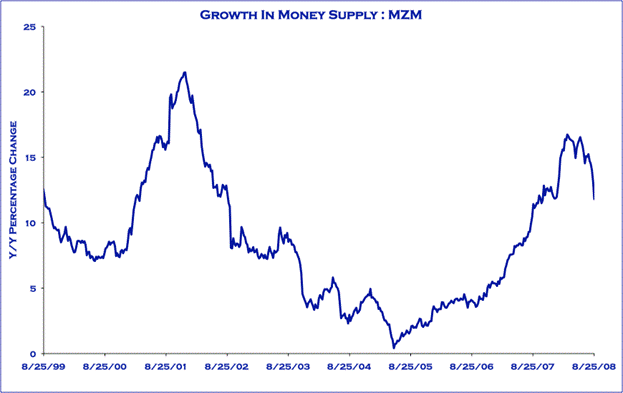FOMC US Interest Rate Meeting of September 16th
Interest-Rates / US Interest Rates Sep 12, 2008 - 02:49 PM GMTBy: Joseph_Brusuelas

 Nearly ten years ago the Federal Open Market Committee convened a special meeting to address the problems in U.S. financial markets regarding the failure at Long Term Capital Management. It is not without irony that one decade later the Fed and the U.S. Treasury are addressing an infinitely more complex problem with respect to Fannie Mae and Freddie Mac, while at the same time contemplating the potential failure of major investment and commercial banks.
Nearly ten years ago the Federal Open Market Committee convened a special meeting to address the problems in U.S. financial markets regarding the failure at Long Term Capital Management. It is not without irony that one decade later the Fed and the U.S. Treasury are addressing an infinitely more complex problem with respect to Fannie Mae and Freddie Mac, while at the same time contemplating the potential failure of major investment and commercial banks.
Unlike the special meeting that occurred over a decade ago, there is little doubt that the Fed will remain on hold ahead of the September 16 FOMC meeting. Due to the issues with inflation that still are at the forefront of Fed considerations, there will be no rate cut to assuage a market still reeling due to the ongoing problems in the financial system.
We expect that the statement will forthrightly acknowledge the actions taken by the U.S. Treasury and employ language regarding positive market reaction in light of the unprecedented move by the Federal Government. The FOMC will probably seek to place light on the narrowing in swap spreads and the decline in long-term mortgage rates that have occurred in the aftermath of Mr. Paulson's statement on Sunday September 7.

Without a doubt the actions taken by the U.S. Treasury will provide a major subject for discussion either in the formal meeting or any prospective special meeting that the statement may announce. The systemic risk posed by the issues at Fannie and Freddie are such that we went back and examined the transcript from the October 15, 1998 meeting surrounding the problems at Long Term Capital Management to ascertain the possible shape of the upcoming statement and the ensuing minutes to the meeting that will be released on October 7.
In that meeting committee members had a three primary concerns that provide an eerie parallel to the current crisis. First the committee was primarily concerned about a potential spillover of instability into the non-financial community. Like today, fear and uncertainty in the markets prevailed.
Second, the committee was concerned with major problems at other banks that were not acknowledged. William McDonough, who was the head of the NY Fed at that time openly, wondered if there were "skeletons still rattling around in the closets that have not been revealed."
Third, the committee was concerned with the issue of moral hazard caused by the bailout.
We think that this provides a good frame or reference in which to evaluate the upcoming FOMC statement. One year into the domestic financial crisis, the market has only observed partial spillover into the greater non-financial community that has largely been responsible for keeping the economy afloat during the crisis. And it is quite clear that many of the financial players singed by the heat from the meltdown in the housing industry have yet to come clean and mark to market their losses.
Given that the financial industry continues to access "temporary credit facilities" at the Fed we would not be surprised to see in a few years when the transcripts for this meeting are released if the committee is found to be considering opening access to such facilities to the non-financial community.
Our Senior Economic Advisor William Poole has made a very persuasive case that the Fed has inadequately defined the post Fannie and Freddie financial world. Concerns over moral hazard still prevail. After saving Bear Stearns we wonder if the Fed might be tempted to say yes, should a large auto company, a large insurance company or a major metropolitan area suddenly need emergency financing. We believe that these are but a few of the ideas behind the interesting discussion taking place in markets regarding the credit quality of the United States.
Thus, we anticipate that the committee will utilize language reinforce its intent to provide adequate liquidity should conditions in the market change in the aftermath of the action taken by the U.S. Treasury.

The committee should note the deceleration in economic activity in the context of weak labor markets and the ongoing stress in financial markets. The statement should retain language regarding the efficacy of past monetary policy with respect to fostering market liquidity and moderate economic growth.
We expect that the committee will note the recent decline in the prices of energy and some commodities, while reaffirming their expectation that inflation will moderate later this year, although that outlook will remain highly uncertain.
The assessment of risks should remain balanced between risk and growth. Even with the basic Taylor Rule implying that monetary policy remains accommodative by at least 150 basis points, the Fed will continue to hold rates steady as it modestly attempts to reduce the money supply after a long period of accommodation.
By Joseph Brusuelas
Chief Economist, VP Global Strategy of the Merk Hard Currency Fund
Bridging academic rigor and communications, Joe Brusuelas provides the Merk team with significant experience in advanced research and analysis of macro-economic factors, as well as in identifying how economic trends impact investors. As Chief Economist and Global Strategist, he is responsible for heading Merk research and analysis and communicating the Merk Perspective to the markets.
Mr. Brusuelas holds an M.A and a B.A. in Political Science from San Diego State and is a PhD candidate at the University of Southern California, Los Angeles.
Before joining Merk, Mr. Brusuelas was the chief US Economist at IDEAglobal in New York. Before that he spent 8 years in academia as a researcher and lecturer covering themes spanning macro- and microeconomics, money, banking and financial markets. In addition, he has worked at Citibank/Salomon Smith Barney, First Fidelity Bank and Great Western Investment Management.
© 2008 Merk Investments® LLC
The Merk Hard Currency Fund is managed by Merk Investments, an investment advisory firm that invests with discipline and long-term focus while adapting to changing environments. Axel Merk, president of Merk Investments, makes all investment decisions for the Merk Hard Currency Fund. Mr. Merk founded Merk Investments AG in Switzerland in 1994; in 2001, he relocated the business to the US where all investment advisory activities are conducted by Merk Investments LLC, a SEC-registered investment adviser.
Merk Investments has since pursued a macro-economic approach to investing, with substantial gold and hard currency exposure.
Merk Investments is making the Merk Hard Currency Fund available to retail investors to allow them to diversify their portfolios and, through the fund, invest in a basket of hard currencies.
Joseph Brusuelas Archive |
© 2005-2022 http://www.MarketOracle.co.uk - The Market Oracle is a FREE Daily Financial Markets Analysis & Forecasting online publication.


